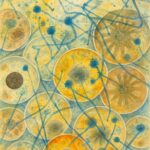Link to Pubmed [PMID] – 33562741
Link to DOI – 10.3390/cells10020337
Cells 2021 Feb; 10(2):
Circulating tumor cells (CTCs) provide an accessible tool for investigating tumor heterogeneity and cell populations with metastatic potential. Although an in-depth molecular investigation is limited by the extremely low CTC count in circulation, significant progress has been made recently in single-cell analytical processes. Indeed, CTC monitoring through molecular and functional characterization may provide an understanding of genomic instability (GI) molecular mechanisms, which contribute to tumor evolution and emergence of resistant clones. In this review, we discuss the sources and consequences of GI seen through single-cell analysis of CTCs in different types of tumors. We present a detailed overview of chromosomal instability (CIN) in CTCs assessed by fluorescence in situ hybridization (FISH), and we reveal utility of CTC single-cell sequencing in identifying copy number alterations (CNA) oncogenic drivers. We highlight the role of CIN in CTC-driven metastatic progression and acquired resistance, and we comment on the technical obstacles and challenges encountered during single CTC analysis. We focus on the DNA damage response and depict DNA-repair-related dynamic biomarkers reported to date in CTCs and their role in predicting response to genotoxic treatment. In summary, the suggested relationship between genomic aberrations in CTCs and prognosis strongly supports the potential utility of GI monitoring in CTCs in clinical risk assessment and therapeutic choice.

